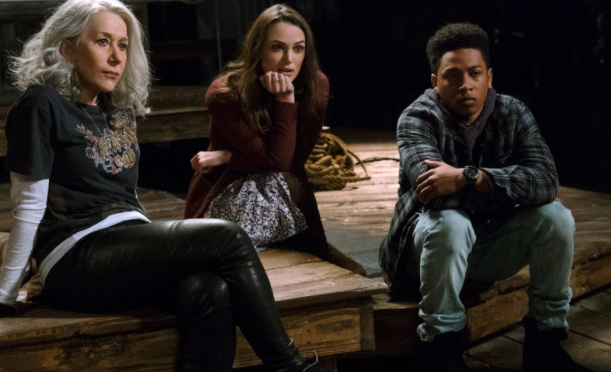While it goes without saying that any movie Will Smith is willing to sign on for is probably going to be unforgivably maudlin (even Bad Boys counts in this category), one expects a bit more grit from a film that co-stars Edward Norton. But no, Collateral Beauty is as predictably catchpenny as one would expect, and, in this regard, could understandably be associated with Collateral Damage, the Arnold Schwarzenegger movie from 2002. Though director David Frankel has helmed such essentials as Miami Rhapsody and The Devil Wears Prada, working with screenwriter Allan Loeb (best known for The Dilemma, Just Go With It and Rock of Ages) somewhat explains the shift in quality.
Focused on a top advertising man named Howard Inlet (Smith) who has lost his daughter to a rare form of cancer two years prior to the current Christmas season, Collateral Beauty is one of those “good” by formulaic structure standards movies. Every plot point and character attribute follows an expected trajectory that audiences of Middle America can’t stop demanding. From the moment we see the intro scene with a happy version of Howard touting the three tenets of advertising–love, time and death–to appeal to the masses on a meaningful level, we know exactly where this is going (especially if we already saw the preview to begin with). Yes, it’s clear that the very things he championed as a way into people’s hearts and psyches are exactly what will come back to haunt him–literally–in human form. Except, unlike the preview might suggest, Aimee a.k.a. “Love” (Keira Knightley), Raffi a.k.a. “Time” (Jacob Latimore) and Brigitte a.k.a. “Death” are not real abstractions, but actors paid by Howard’s advertising partners, Whit Yardsham (Edward Norton), Simon Scott (Michael Peña) and Claire Wilson (Kate Winslet), to push Howard just far enough over the edge to convince an interested buyer that he’s not fit to vote in the selling of the company.
After Whit hires Sally Price (Ann Dowd), the same private detective who caught him cheating during his own marriage, to follow Howard, she manages to extract the letters he sends to Love, Time and Death from the post office box he deposits them in, subsequently giving them back to each “character” so that they can convince Howard they’re real. Like anyone probably would (mind you, this is the New York of 2016, not 1976–when rough-hewn New Yorkers couldn’t be conned by anybody), Howard does start to freak out when Death visits him in a beret at a dog park he frequents. Though he tries to write off the encounter at first, ignoring the very words he wrote quoted back to him, it’s harder to avoid the streetwise, tough-love persona of “Time,” sort of representing the A Christmas Carol version of “the present.” Confronting him in his office amid towering rows of dominoes (we later see Howard talking to his daughter in a home movie of him playing the game with her and saying as they topple over, “Now we start all over again”), “Time” has, well, no time for wallowing, self-pitying bullshit. “Love,” on the other hand, makes a far less memorable impression as she walks into the the diner Howard sits alone at, choosing to weep with little dialogue thrown in.
An indicator of the past, “Love” is arguably the most painful entity for Howard to encounter, a reminder that he has it no longer–at least not from his daughter, the person he valued most in the world. Meanwhile, Whit’s own daughter, Allison (Kylie Rogers), won’t even speak with him as a result of her anger over his “philanthropy,” or rather, philandering. Simon, too, deals with his own issues, a latent cancer from his youth returning to haunt him. And then there’s Claire, realizing she’s losing the race to her biological clock if she doesn’t soon enlist the help of a sperm bank. It’s all very trite, and yet, so is A Christmas Carol–which has long needed a modern update (though The Muppet Christmas Carol is a more than adequate antidote to the increasing banality of Dickens).
Collateral Beauty is the natural choice for A Christmas Carol 2.0 with its knack for boiling down everything as simply as Howard saying–pre-depression, mind you–“We’re here to connect. Love, time, death. Now these three things connect every single human being on earth. We long for love, we wish we had more time, and we fear death.” With love as the past, time as the present, death as the future and Howard as the immoveable Ebenezer Scrooge, audiences may be revisiting Collateral Beauty for many Christmases to come. Unless, of course, Bad Santa 3 comes along as a substitute. And if, as Howard’s group grief counselor (among other things you’ll see in the plot “twist”), Madeleine (Naomie Harris), is correct in spouting that the definition of the film’s title is “the profound connection to everything,” then it should, at the very least make you feel better as you get felt up in airport security to go back home from your holiday haze to write it off as collateral beauty.





















